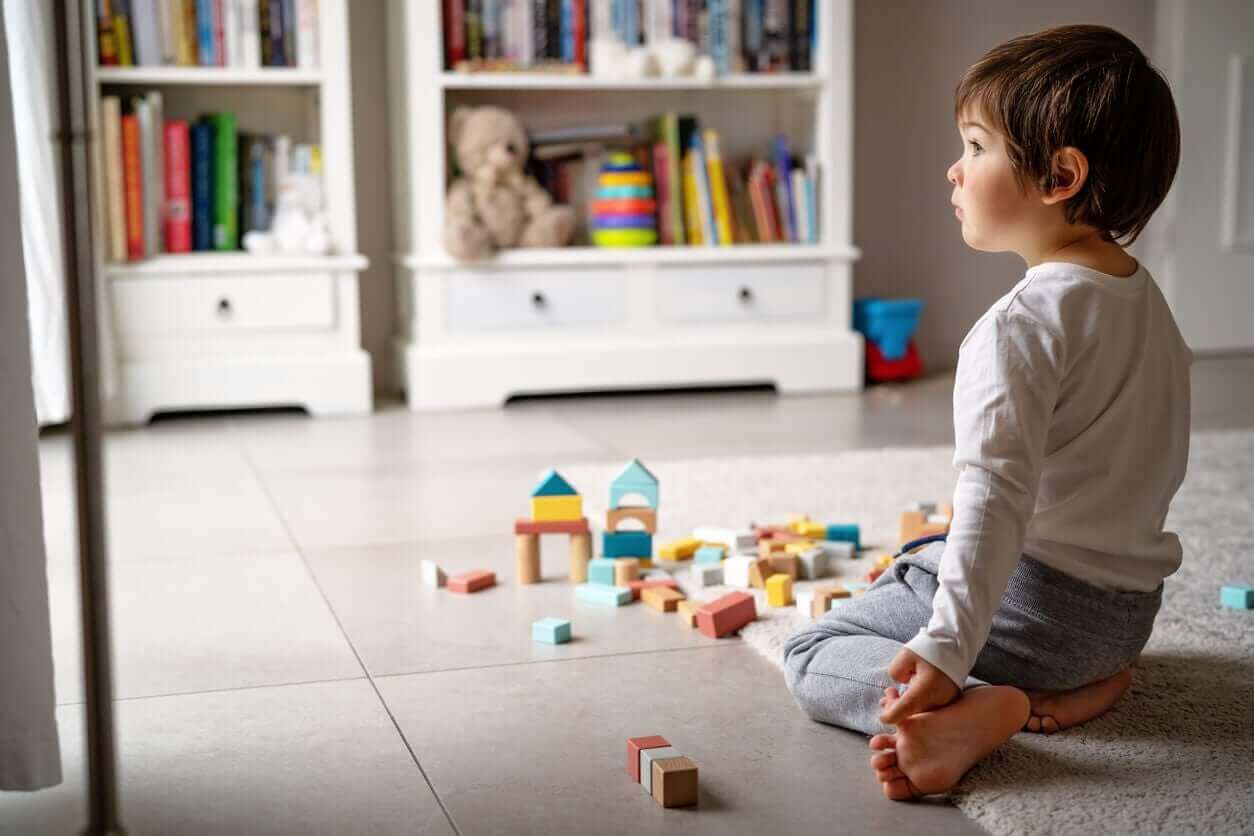5 Signs That Your Child Is Unhappy

Achieving happiness is easier than it seems. Although most of the time, we think that we should demonstrate it through exaggerated behaviors, this doesn’t have to be the case. In fact, this feeling can take many forms and each person experiences it in their own way: For some, it’s synonymous with tranquility, while for others, it implies euphoria. However, when a person isn’t quite well, the signs they show are somewhat clearer. If you think your child is unhappy, check out these signs.
How can you tell that your child is unhappy?
To know how your child is, the main thing you need to do is observe their behavior and try to detect any change from their usual state.
Here are some of the signs that you should take into account when analyzing their behavior.
1- They no longer enjoys what they used to enjoy
While it’s true that children’s interests vary throughout life, it’s important to note the spirit with which they carry out certain daily activities. A change in the way they cope, such as apathy or listlessness, may indicate that something is happening to them.
No one knows your son or daughter better than you, so trust your motherly instincts.
2- They have no interest in playing
Especially in the case of young children, play is their main means of expression and communication, even when they need to carry out unpleasant experiences.

A child who loses interest in playing, even on their own, is always a red flag.
3- They have insomnia problems and they feel sick very often
Besides organic causes, sleeping difficulties (insomnia) can appear when a child has an emotional problem. Likewise, when they show a loss of interest in food, dislike everything they eat, complain of headaches very often, or show other signs of physical discomfort.
4- They’re irritable and complain continuously
We can all have our emotional ups and downs from time to time, but these should alert us if the child presents them frequently or their episodes of anger, rage, or anguish are very marked.
When a child feels unhappy, they’re usually angry with the world and criticize everything around them.
5- They no longer smile or are happy about anything
Especially when the environment is healthy and the child has good support, is happy, laughs, and enjoys many moments.
In general, little ones don’t perceive certain difficulties of daily life very well and that’s why they exude joy wherever they go. On the other hand, when they feel unhappy, this situation drastically changes and they become lonely, self-absorbed, and stop smiling.
You may also be interested in: 8 Things that Make Your Child Happy
What to do if your child is unhappy?
First of all, the most important thing is to reach out and try to talk to them in a context of trust and empathy. They may not want to tell you right away, but by becoming aware of your concern, they’ll be able to do so when they feel ready.
Managing emotions is also an important lesson of parenting because too much emphasis is often placed on academic knowledge and little importance is given to emotional education. For this reason, it’s important to teach children to recognize their emotions and allow them to express them without fear or shame. In addition, this will allow them to develop empathy and decode the feelings of others.
Another aspect to take into account is to review your own behavior, as authoritarian, overly demanding, or perfectionist parenting styles lead to children feeling pressured and not knowing how to enjoy themselves.
Finally, beyond these recommendations, it’s good to keep in mind that there are serious cases that deserve professional intervention. Sometimes sadness and discouragement are chronic and cause a significant deterioration in that person’s quality of life. Depression is an example of this and requires a specific psychological approach.

Learn more: 6 tips to raise a happy child
You can also learn to be happy!
Happiness is a state of mind that’s achieved when we stop putting expectations in the wrong place and learn to connect our own desires with our actions.
For this reason, we can learn to be happy and put it into practice day by day in the small daily acts that we don’t usually value.
Many little ones mistake happiness for going on a vacation to the beach, having the latest toys or technology, or getting the best grade in school. However, they can find happiness on a walk with Grandma, while sliding down the slide with a friend, or during a picnic outside.
It’s also important to note that happiness doesn’t have to be permanent, as life is a spectrum of emotions and each day is different from the others. We can expect to have days that are grayer than others because these help us to grow, to improve ourselves, and to change what we don’t like or makes us feel bad.
Remember that learning to recognize and express emotions is key to the health of our children and parents have a very important role in their teaching.
Achieving happiness is easier than it seems. Although most of the time, we think that we should demonstrate it through exaggerated behaviors, this doesn’t have to be the case. In fact, this feeling can take many forms and each person experiences it in their own way: For some, it’s synonymous with tranquility, while for others, it implies euphoria. However, when a person isn’t quite well, the signs they show are somewhat clearer. If you think your child is unhappy, check out these signs.
How can you tell that your child is unhappy?
To know how your child is, the main thing you need to do is observe their behavior and try to detect any change from their usual state.
Here are some of the signs that you should take into account when analyzing their behavior.
1- They no longer enjoys what they used to enjoy
While it’s true that children’s interests vary throughout life, it’s important to note the spirit with which they carry out certain daily activities. A change in the way they cope, such as apathy or listlessness, may indicate that something is happening to them.
No one knows your son or daughter better than you, so trust your motherly instincts.
2- They have no interest in playing
Especially in the case of young children, play is their main means of expression and communication, even when they need to carry out unpleasant experiences.

A child who loses interest in playing, even on their own, is always a red flag.
3- They have insomnia problems and they feel sick very often
Besides organic causes, sleeping difficulties (insomnia) can appear when a child has an emotional problem. Likewise, when they show a loss of interest in food, dislike everything they eat, complain of headaches very often, or show other signs of physical discomfort.
4- They’re irritable and complain continuously
We can all have our emotional ups and downs from time to time, but these should alert us if the child presents them frequently or their episodes of anger, rage, or anguish are very marked.
When a child feels unhappy, they’re usually angry with the world and criticize everything around them.
5- They no longer smile or are happy about anything
Especially when the environment is healthy and the child has good support, is happy, laughs, and enjoys many moments.
In general, little ones don’t perceive certain difficulties of daily life very well and that’s why they exude joy wherever they go. On the other hand, when they feel unhappy, this situation drastically changes and they become lonely, self-absorbed, and stop smiling.
You may also be interested in: 8 Things that Make Your Child Happy
What to do if your child is unhappy?
First of all, the most important thing is to reach out and try to talk to them in a context of trust and empathy. They may not want to tell you right away, but by becoming aware of your concern, they’ll be able to do so when they feel ready.
Managing emotions is also an important lesson of parenting because too much emphasis is often placed on academic knowledge and little importance is given to emotional education. For this reason, it’s important to teach children to recognize their emotions and allow them to express them without fear or shame. In addition, this will allow them to develop empathy and decode the feelings of others.
Another aspect to take into account is to review your own behavior, as authoritarian, overly demanding, or perfectionist parenting styles lead to children feeling pressured and not knowing how to enjoy themselves.
Finally, beyond these recommendations, it’s good to keep in mind that there are serious cases that deserve professional intervention. Sometimes sadness and discouragement are chronic and cause a significant deterioration in that person’s quality of life. Depression is an example of this and requires a specific psychological approach.

Learn more: 6 tips to raise a happy child
You can also learn to be happy!
Happiness is a state of mind that’s achieved when we stop putting expectations in the wrong place and learn to connect our own desires with our actions.
For this reason, we can learn to be happy and put it into practice day by day in the small daily acts that we don’t usually value.
Many little ones mistake happiness for going on a vacation to the beach, having the latest toys or technology, or getting the best grade in school. However, they can find happiness on a walk with Grandma, while sliding down the slide with a friend, or during a picnic outside.
It’s also important to note that happiness doesn’t have to be permanent, as life is a spectrum of emotions and each day is different from the others. We can expect to have days that are grayer than others because these help us to grow, to improve ourselves, and to change what we don’t like or makes us feel bad.
Remember that learning to recognize and express emotions is key to the health of our children and parents have a very important role in their teaching.
All cited sources were thoroughly reviewed by our team to ensure their quality, reliability, currency, and validity. The bibliography of this article was considered reliable and of academic or scientific accuracy.
- Bilbao, A. (2015) El cerebro del niño explicado a los padres. Editorial: Plataforma Actual
- Fernández-Berrocal, P., & Extremera Pacheco, N. (2002). La inteligencia emocional como una habilidad esencial en la escuela. Revista Iberoamericana De Educación, 29(1), 1-6. https://doi.org/10.35362/rie2912869
- Goleman, D. (2010). La práctica de la inteligencia emocional. Editorial Kairós.
- Márquez Cervantes, M. C., & Gaeta González, M. L. (2017). Desarrollo de competencias emocionales en pre-adolescentes: el papel de padres y docentes. Revista Electrónica Interuniversitaria de Formación del Profesorado, 20(2), 221–235. https://doi.org/10.6018/reifop/20.2.232941
This text is provided for informational purposes only and does not replace consultation with a professional. If in doubt, consult your specialist.








